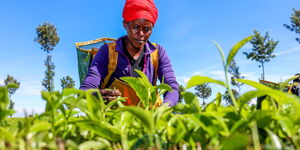Parliament is plotting to compel the national and county governments to establish new land zoning laws to protect agricultural land that reports show is quickly dwindling.
Land zoning is the process of regulating land use by designating areas for development, urbanisation and agricultural use. These regulations detail what types of activities are permitted in each zone, such as residential, commercial, or industrial use.
According to the National Assembly's Motion Paper for Wednesday, September 24, Westlands MP Timothy Wanyonyi, who is sponsoring the motion, argues that the move will ensure that the development of other infrastructural structures, such as commercial and residential, is regulated.
Wanyonyi asserted that the lack of such a solid zoning framework has led to a decrease in agricultural land and the sector's productivity, due to unplanned infrastructural development.
Citing a survey by the Kenya Land Alliance, Wanyonyi, in his motion, claimed that only 17 per cent of the country's land is classified as suitable for agriculture.
"The Kenya Land Alliance estimated that only 17per cent of the country’s land mass is classified as suitable for rain-fed agriculture, while the remainder is either semi-arid or arid. The country’s agricultural productivity has been decreasing over the years," Wanyonyi stated.
"This decline in agricultural productivity is partly attributable to the shrinking agricultural land due to unplanned settlements that encroach on agricultural lands," he added.
The push comes two months after the Ministry of Agriculture revealed that it is willing to lease public land to large-scale farmers to increase agricultural productivity.
In a statement on Thursday, July 24, Agriculture Cabinet Secretary Mutahi Kagwe said that the government will specifically target farmers willing to grow fodder and sunflowers, which are among the ingredients used for sustainable daily farming.
Kagwe noted that the move is among the key initiatives the government is implementing to address significant challenges, such as inadequate livestock feed, post-harvest losses, and climate change-related issues, that have long plagued dairy farming in the country.
"We must adopt practical and viable interventions to transform the dairy sector. We must synergise our efforts to increase production and productivity through the commercialisation of pasture and fodder production," Kagwe stated.
"The government intends to lease available arable public land for large-scale farming of fodder, sunflower, and other requisite ingredients that will bring down the cost of production to scale up dairy productivity," he added.












